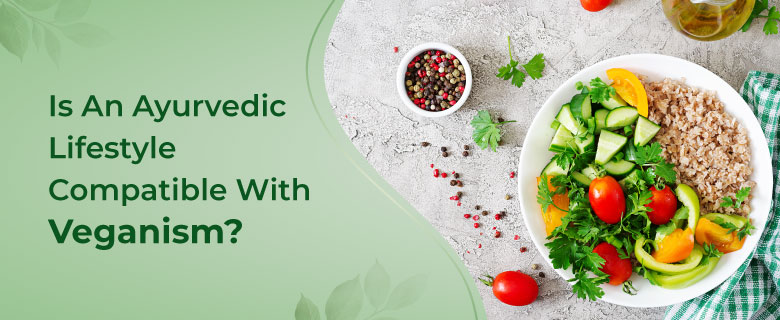
Is An Ayurvedic Lifestyle Compatible With Veganism?
This World Vegan Day, you must have realised that Veganism is the new trend as every other person embraces a vegan lifestyle. An Ayurvedic lifestyle is also something that many are interested in as it supports a holistic viewpoint of health. But are these two things compatible? How is Ayurveda connected to veganism? Are there any pitfalls for someone interested in pursuing both? In this article, we’ll look at some similarities and differences between Ayurveda and vegan lifestyle and how to reconcile these.
What is Veganism?
Veganism is a dietary philosophy that excludes animal food and products. Vegans do not use or consume animal products, including meat, poultry, seafood, eggs, dairy products or even honey. Vegans also do not wear clothing made from animals, such as leather shoes or belts.
Veganism is gaining popularity in India and has many benefits for the environment and your health. However, many vegans find it difficult to practice an Ayurvedic lifestyle, including meat and dairy products.
Veganism has been practiced in India since ancient times, even before the birth of Ayurveda. There are more than 1.5 billion vegetarians worldwide. In India, 31% of the population are vegetarians. However, only 24% of Indians are vegans.
How does veganism align with Ayurveda?
Veganism and Ayurveda are ancient health philosophies focusing on well-being, balance, and body healing. Veganism is a lifestyle choice that excludes animal products like meat, eggs, dairy, and even honey. In Ayurveda, the focus is more on Satvik, Rajasik, and Tamasik food. Unlike modern medicine, all dairy products are not the same in characteristics.
The Ayurvedic diet includes dairy products, but they have different effects on Prakriti during different seasons. Ayurvedic diet has been around for thousands of years, and it is based on the belief that health is determined by the balance between three doshas: Vata dosha, Pitta dosha and Kapha dosha (air, fire and water). A healthy body should aim at having an equal balance between these doshas.
Veganism is compatible with Ayurveda as long as it is done in moderation and does not interfere with the balance of doshas in the body. However, if you are considering adopting a vegan lifestyle for health reasons, it is essential to understand how this may affect your dosha balance.
The ayurvedic principle of changing your diet as per the seasons (Rutucharya) supports consuming food available during particular times of the year. Adhering to this practice helps maximise its nutritional value and avoid allergic reactions caused by environmental changes. Eating seasonally reduces food waste and carbon emissions associated with shipping foods around the globe.
Furthermore, Ayurveda focuses on consuming simple yet nutritious food. It recommends consuming fresh, whole, and unprocessed food. Additionally, it suggests consuming minerals rich, high in fibre and complex carbohydrates, and low in fat, oil, and refined sugar.
What are the benefits of a vegan diet and an Ayurvedic diet?
Many people choose to become vegans for ethical reasons: they do not want to eat animals or use animal products. Others choose this diet because they believe it is healthier than other diets. Some people even go on a plant-based diet because they think they are doing their part in saving the planet by reducing their carbon footprint.
One of the most significant benefits of following an ayurvedic lifestyle is having more energy throughout the day because your digestion will be stronger than ever. You’ll also find yourself sleeping better at night.
A vegan diet may help you lose weight when combined with exercise because it focuses on complex carbohydrates rather than simple sugars found in processed foods and meat products.
Vegans tend to have lower cholesterol levels than people who regularly eat meat and dairy products due to the high fibre content of plant-based foods such as vegetables and grains.
Ayurvedic Tips for Vegans
Ayurveda recommends eating natural foods like fruits and vegetables rather than processed foods. These foods contain vitamins and minerals that help keep your body working correctly and give it energy for daily activities.
- Reduce stress levels as it can lead to many health problems, such as high blood pressure or heart disease, so it’s essential to keep stress levels low.
- Avoid cold drinks and sodas, as they dehydrate your body and disrupt digestion. Drink plenty of water throughout the day instead. You can also add fresh lemon juice, ginger, or mint leaves for flavour if you are bored with plain water!
- Drink warm liquids like herbal teas after meals to aid digestion and prevent acid reflux from happening too often.
- Eat whole foods, minimally processed and organic, whenever possible.
- Try to cook at home as much as possible instead of eating out or ordering takeout.
- Avoid processed foods and anything with artificial ingredients or preservatives in them.
If you’re a vegan, you might think an Ayurvedic lifestyle isn’t for you. But the ayurvedic lifestyle stresses having sattvic food, which is very close to veganism. Here are some ayurvedic lifestyle tips that help you stay aligned with veganism.
- Adopting a sattvic diet calms, purifies, and energises the mind and body by removing toxins from the body and ensuring longevity and health.
- Consuming freshly cooked food as it removes germs or infections and makes it easy to digest.
- Regular consumption of a sattvic diet helps develop and rebuild strong body tissues.
The way forward
If you want to reap the full benefits of a vegan diet, it would be best to seek a consultation with an ayurvedic practitioner who can tailor your diet based on your dosha, prakruti, and vikruti. Connect with expert ayurvedic vaidyas and nutritionists at Ayuvi, who will curate a vegan diet plan for you aligned with an Ayurveda-centric lifestyle.





0 Comment
No comments found.Thank you. Your comment will be visible after an approval.
Add your comment